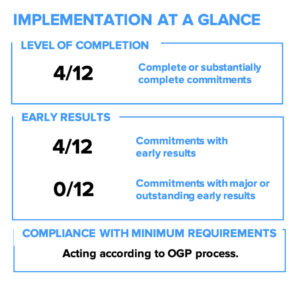Romania Results Report 2020-2022
- Action Plan: Romania Action Plan 2020-2022
- Dates Under Review: 2020-2022
- Report Publication Year: 2023
Romania’s fifth action planAction plans are at the core of a government’s participation in OGP. They are the product of a co-creation process in which government and civil society jointly develop commitments to open governmen... improved the country’s legislative framework for open dataBy opening up data and making it sharable and reusable, governments can enable informed debate, better decision making, and the development of innovative new services. Technical specifications: Polici... and established a new Open Government PartnershipThe Open Government Partnership (OGP) is a multi-stakeholder initiative focused on improving government transparency, ensuring opportunities for citizen participation in public matters, and strengthen... More (OGP) multi-stakeholder forumRegular dialogue between government and civil society is a core element of OGP participation. It builds trust, promotes joint problem-solving, and empowers civil society to influence the design, imple.... However, its implementation rate declined with the onset of COVID-19 and institutional changes in government.
 Early ResultsEarly results refer to concrete changes in government practice related to transparency, citizen participation, and/or public accountability as a result of a commitment’s implementation. OGP’s Inde... More
Early ResultsEarly results refer to concrete changes in government practice related to transparency, citizen participation, and/or public accountability as a result of a commitment’s implementation. OGP’s Inde... More
Four of the action plan’s twelve commitments marginally opened government. CommitmentOGP commitments are promises for reform co-created by governments and civil society and submitted as part of an action plan. Commitments typically include a description of the problem, concrete action... 12 made a long-awaited improvement to Romania’s legislative framework for open data by transposing a relevant EU directive to national law. Commitments 1, 5, and 8 also made progress on sharing public participationGiving citizens opportunities to provide input into government decision-making leads to more effective governance, improved public service delivery, and more equitable outcomes. Technical specificatio... recommendations with local governments, improving transparencyAccording to OGP’s Articles of Governance, transparency occurs when “government-held information (including on activities and decisions) is open, comprehensive, timely, freely available to the pub... More of government nonrefundable financing contracts, and supporting national minorities’ linguistic rights. Although in terms of design, Commitments 7 and 11 also planned for promising reforms, limited implementation meant they did not produce results in opening government during the action plan cycle. The same was the case for the action plan’s other commitments.
CompletionImplementers must follow through on their commitments for them to achieve impact. For each commitment, OGP’s Independent Reporting Mechanism (IRM) evaluates the degree to which the activities outlin... More
Four of the action plan’s twelve commitments were substantially or completely implemented (Commitments 1, 5, 8, and 12), a lower implementation rate than that of the previous action plan. These commitments benefited from targeted efforts by the General Secretariat of the Government, Romania’s OGP point of contact (POC), which was the lead implementer for Commitments 1 and 12, as well as the Department for Interethnic Relations, which was the lead for Commitment 8. These commitments were also focal points for civil society investment in the action plan, as civil society suggestions were the initial basis for Commitments 5 and 12. Among the action plan’s most promising commitments, Commitment 12 was substantially completed, but Commitments 7 and 11 saw limited implementation. Overall, stakeholders reported that the onset of the COVID-19 pandemic was a major obstacle to implementation, shifting agencies’ priorities and resources away from commitments. Civil society stakeholders did not fill gaps in implementation for most commitments, which were based on government workplans rather than civil society priorities.
Participation and Co-Creation
Romania’s OGP process was led by the General Secretariat of the Government and the National Coordination Committee (Comitetul National de Coordonare, or CNC), its newly formed multi-stakeholder forum. The CNC was seen as an improvement on Romania’s former multi-stakeholder forum in terms of civil society representation, regularity of meetings, and operational framework. Romania’s OGP Club also began meeting again, hosting dialogue between government and civil society actors on broader open government topics. However, direct civil society engagement in implementation of most commitments was limited, stemming from narrow involvement in the co-creation processCollaboration between government, civil society and other stakeholders (e.g., citizens, academics, private sector) is at the heart of the OGP process. Participating governments must ensure that a dive.... During the design phase, civil society stakeholders submitted six commitment proposals, and government stakeholders submitted fifty-three. In the final action plan, three commitments were adapted from the civil society proposals (Commitments 5, 6, and 12), and the other nine were based on government proposals. Implementation of the commitments that emerged from civil society proposals benefited from a stronger level of collaboration.
Implementation in Context
Implementation of the action plan was slowed by the onset of the COVID-19 pandemic, with a national lockdown between March and May 2020. Public gatherings were suspended, though some of those restrictions were loosened in September. Romania faced one of the highest COVID-19 death rates in the European Union.[1] It also dealt with rising energy costs combined with the fourth-highest rate of inflation among EU countries as of October 2021.[2] Following a no-confidence motion, the coalition government elected in late 2020 was replaced by an interim government and then reformed in late 2021. Political instability shifted distribution of government positions and ministries,[3] with turnover impacting institutional commitment to the action plan’s initiatives.
[1] Cristian Gherasim, “Romania Reaches Historic High in Covid Deaths,” EUobserver, November 5, 2021, https://euobserver.com/coronavirus/153428.
[2] Eurostat, Annual Inflation Up to 4.1% in the Euro Area, November 17, 2021, https://ec.europa.eu/eurostat/documents/2995521/11563383/2-17112021-AP-EN.pdf/b67f7d33-43d7-d111-b3ed-5cbc499304b2.
[3] “Nations in Transit 2022: Romania,” Freedom House, https://freedomhouse.org/country/romania/nations-transit/2022.
Downloads
- Romania_Results-Report_2020-2022_EN
- Romania_Results-Report_2020-2022_RO
- Romania_Results-Report_2020-2022_Comments-Received

Leave a Reply